Submitted by Reef Check Malaysia
In conjunction with Earth Day, Reef Check Malaysia was thrilled to announce that after 16 years of coral reef conservation, we’re making waves with a major pivot! Introducing the evolution of Reef Check Malaysia (RCM), as we broaden our scope to protect all marine ecosystems.
RCM is now a ‘marine ecosystems conservation’ organization as we shift our focus to include seagrass and mangrove ecosystems, deepening our collective understanding of environmental interconnectedness. Here is our new mission and vision:
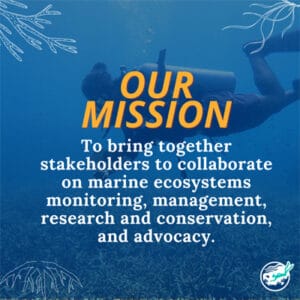
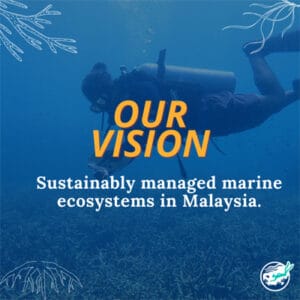
Our CEO, Julian Hyde, explains more about our pivot in focus here.
Coral Bleaching
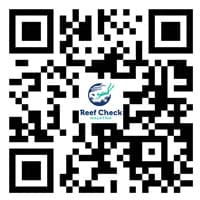
Coral bleaching occurrences have become more frequent and severe in recent decades, posing a significant threat to coral reef ecosystems around the world. The loss of coral reefs has surpassed the ecological, economic, and social consequences threshold, as coral reefs are the world’s most diverse marine ecosystems, in addition to providing coastal protection, supporting fisheries, and contributing to tourism.
NOAA’s Coral Reef Watch is showing the predicted mass coral bleaching happening this year. Our Reef Check Malaysia teams at various locations are also actively monitoring for coral bleaching and have activated RCM’s Coral Bleaching Response Plan, having received a warning from NOAA.
We welcome the public to help us monitor the health of Malaysia’s coral reefs. If you’re in Malaysia and have seen any bleaching corals, you can report your observations to us at https://bit.ly/rcmbleachingreport or by scanning the QR code. We can work together towards the preservation and recovery of our coral reefs.
Local Marine Conservation Groups Meet
A few weeks ago, RCM organized a trip for the members of the Redang Marine Conservation Group (RMCG). Led by our colleagues from Redang Island, they paid a visit to Tioman Island, to meet our RCM colleagues and the Tioman Marine Conservation Group (TMCG) team!
The RMCG team spent four days on Tioman, learning and sharing experiences with the TMCG team on various marine conservation efforts and issues. They also had the opportunity to conduct marine biodiversity monitoring as well as visiting “Rumah Hijau” where all the recycling activities on the island are conducted. RCM has been working to send our colleagues on the ground from one location to another, in an effort to help them learn and understand each other’s work better and gain necessary insights that will help them serve their community better.
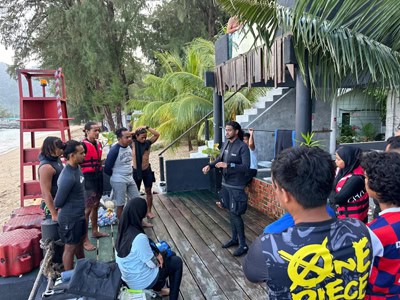
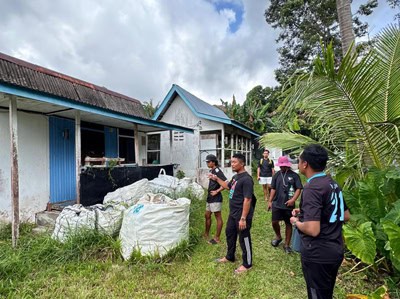
Waste Management & Recycling Program
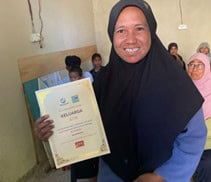
Since its introduction about three years ago, the local islanders of Mantanani have been exposed to waste management and its benefits. Recently, our colleague on the island organized a community engagement session focusing on waste management, attended by close to 100 islanders. We discussed the challenges faced by the efforts, and also updated them regarding the current status and progress of the waste management program. We also took the opportunity to award 80 households with a “Certificate of Excellence” for their full participation and compliance with the program throughout 2023.
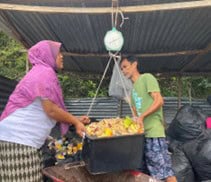
In an effort to extend the program, our local waste management team on Mantanani embarked on a trial to compost daily collected waste. On the first day, the team successfully processed more than 80 kg of food waste which will be composted. This extension was tested as a bid to reduce the amount of food waste that is collected by the local team every day. We hope that in the near future, composting will be a regular activity adopted by the local community.
Meanwhile in the Mersing group of islands, the recycling program in Pulau Tinggi has successfully collected over 100 kg of recyclable materials, including plastic bottles, metal and aluminum tins, and glass bottles. Since its inception in August 2023, the program has received overwhelming support and participation from the island community members. Additionally, tourism operators on the island have expressed interest to collaborate in this initiative, further enhancing waste management efforts on the island. This year, we plan to extend the recycling program to Pulau Aur and Pemanggil. We hope that by sharing the outcomes and progress achieved through the recycling programs in Pulau Sibu and Pulau Tinggi with other island communities, the initiatives will also be accepted across the Mersing islands.
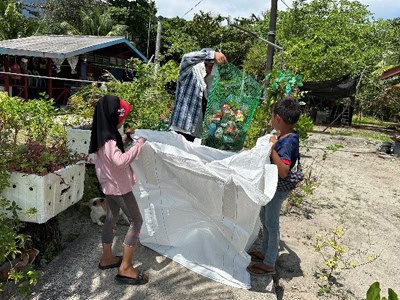
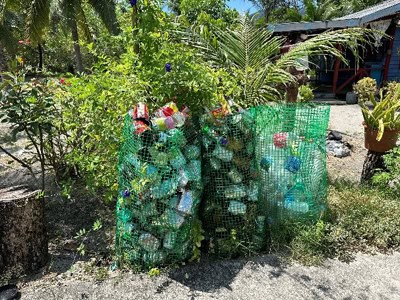
Mooring Buoys Installation
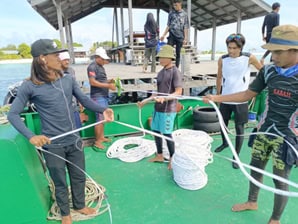
Our colleagues in Semporna, together with representatives from Jeti Pelancong Semporna, the Semporna Professional Divers Association – SPDA, Semporna District Office, youth leaders from the Larapan Marine Conservation Groups, and Pulau Sipadan Resorts & Tours, deployed four mooring buoys in Timba-Timba Island. These sites are famous with tourists, who come over for snorkelling or diving. Recognizing the possible damage caused by anchor impact, the installation was done promptly to solve the problem and to promote the use of mooring buoys at other sites too. Each of the buoys are able to accommodate 3 to 5 boats at a time, as they are supported by sinkers made from metal drums filled with cement.
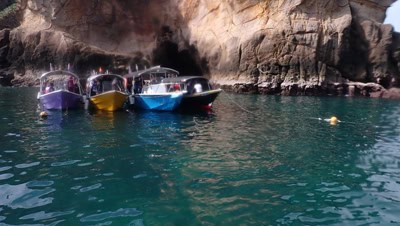
In the Mersing group of islands, we have successfully installed an additional eight mooring buoys at various snorkeling sites. This activity was conducted in collaboration with Mersing District Council, the local island community, and boat operators. The installation of mooring buoys offers a more environmentally friendly alternative compared to the usage of anchors which can be damaging to marine habitats such as coral reefs, seagrass beds and other underwater ecosystems. Additionally, the mooring buoys also help to facilitate safe boat operations and island-hopping activities around coral reef areas on the islands.
 Subscribe to Newsletter
Subscribe to Newsletter Donate
Donate Shop
Shop 0
0









